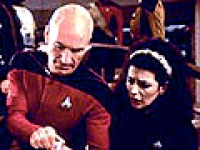Star Trek: The Next Generation — 1x01 — Encounter At Farpoint, Part I
Synopsis
The new U.S.S. Enterprise and its crew set out "to boldly go where no one has gone before."
Filler rating: not filler
Introduces numerous characters and plot threads that continue throughout Star Trek going forward.
Remarkable scenes
- The first sight of the Enterprise-D.
- Data listing the synonyms for snooping.
- Data reciting dialog in Picard's and Q's voices.
- Picard: "I'm not a family man, Riker, and yet Starfleet has given me a ship with children aboard. And I don't feel comfortable with children. But since a captain needs an image of geniality, you're to see that's what I project."
- Geordi regarding his visor: "It's a remarkable piece of bio-electronic engineering by which I quote 'see' much of the EM spectrum ranging from simple heat and infrared through radio waves, etc, etc and forgive me if I've sat and listened to this a thousand times before."
- McCoy's visit to the Enterprise-D and his interaction with Data.
Review
Set in the 24th century, almost a century after TOS, Star Trek: The Next Generation looks quite different and more modern than TOS. This much-needed update to the aesthetics not only looks fantastic, it was also transitioned to remarkably smoothly. The transition from TOS, to the films, to TNG was a slow, step-by-step evolution of the 23rd century TOS aesthetic into the new 24th century aesthetic. While the new TNG look is certainly quite different, you can trace its visual design lineage back to TOS in a number ways. In this way, TNG is not a reboot, but a respectful continuation of a now epic story; a sentiment that couldn't have been expressed better than to have an aged McCoy pass the torch to a member of the new Enterprise's crew. Quite a touching moment.
In addition to new aesthetics, this new century comes with a changed Starfleet. Gone are the days when the flagship was commanded by the brash, impulsive, even reckless at times Captain Kirk. The Federation has matured now. Exploration of space has become more rigorous and routine. Captain Picard reflects this new culture with his stern, rigid personality. Life aboard the Enterprise-D is a buttoned-down affair and even children like Wesley Crusher can't help but subdue their otherwise unbridled whimsy to stand in respectful awe of the professionalism and grandeur of the operation. Perhaps the most remarkable sign of societal progress as compared to TOS is that there's even a Klingon officer serving in Starfleet now, something that would be hard to imagine during Kirk's era.
But what fun would it be to watch the glorious Galaxy-class flagship sail through the ocean of space exploring the universe in the orderly, leisurely fashion that Captain Picard would have us do? That's where Q comes in. This delightful antagonist—as he is not quite a villain—is the avatar of everything Picard is not. Q injects chaos into Picard's perfect order and ugly nuances into Picard's rosy assessment of the progressive society that the Federation has built. Certainly Q is serving as mostly a troll under the bridge, and we can't quite know what motivates his trolling, but his arguments about humanity are not without their merits. And watching the fantastic actors Patrick Stewart (Picard) and John de Lancie (Q) duel each other in a battle of words is a great deal of fun.
Unfortunately the "god-like alien toys with the heroes" plot device has become quite the cliche on Star Trek by now, as TOS did this to death. However, Encounter at Farpoint still manages to be one of the best invocations of this cliche so far and Picard's steadfast resistance to Q's low opinion of humanity is certainly in the spirit of Star Trek.
Another wrinkle in the story is how the new fictional history of Earth interacts with established canon from TOS. We learn here that sometime after the eugenics war in the 1990s established on TOS, there was in fact another war referred to as the third world war which took place decades later. This would seem to contradict Spock's line in TOS: Space Seed that the 1990s eugenics war was Earth's "last world war." An unfortunately sloppy error in what is an otherwise reasonably strong, if somewhat slow-paced start to this new series.
